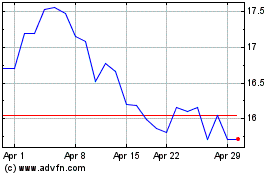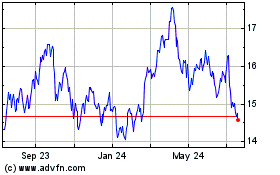Moody's Cuts Canadian Oil Sands' Rating to Junk Status
February 12 2016 - 6:00PM
Dow Jones News
CALGARY, Alberta—The credit rating of Canadian Oil Sands Ltd.,
which was recently acquired by Suncor Energy Inc., was cut to
speculative grade on Friday, making it the first large Canadian oil
producer to receive a "junk" credit rating in at least a
decade.
Citing a high cost structure and low oil prices, Moody's
Investors Service slashed its assessment of Canadian Oil Sands'
senior unsecured debt by three notches to "Ba3," down from the
lowest level of investment-grade credit, or "Baa3."
Moody's also cut its rating of Canadian Oil Sands' parent Suncor
by one notch from "A3" to "Baa1," which remains in the higher
quality investment grade debt category. The ratings outlook for
both companies is now "stable," Moody's said.
Industry leader Suncor earlier this month acquired 73% of
Canadian Oil Sands' shares, giving it control of the company, which
is the largest owner of the Syncrude oil-sands mining consortium.
Together with its existing stake, Suncor now effectively owns 49%
of Syncrude.
Representatives for Suncor and Canadian Oil Sands weren't
immediately available for comment.
Canadian Oil Sands' status as an affiliate of Suncor kept its
credit two notches higher than Moody's stand-alone assessment of
the company, but the junk rating reflects Suncor's decision not to
guarantee about $1.5 billion in outstanding debt.
"In the last 10 years, it's the first time" a large Canadian oil
company has lost its investment-grade rating, said Terry Marshall,
a senior vice president at Moody's.
Calgary-based Nexen Inc. and Talisman Energy Inc. teetered on
the brink of junk status with "Baa3" ratings and negative outlooks
before each was acquired by companies with stronger balance sheets,
he said.
Chinese state-controlled energy giant Cnooc Ltd. bought Nexen in
2013 and Repsol SA of Spain purchased Talisman last year.
Moody's said that, with operating costs of 55 Canadian dollars
(US$39.69) a barrel, Canadian Oil Sands is suffering negative cash
flow at current spot market prices for its synthetic crude
processed from oil-sands asphalt.
"COS will need to rely on its committed liquidity and voluntary
support from Suncor to fund negative free cash flow of about $400
million through" 2017, Moodys' said, noting Syncrude has
experienced a series of operational problems that reduced its
output.
Moodys' said its decision to cut Suncor's rating reflected a
deterioration in the company's cash flow from low oil prices, its
high level of spending to complete a new multibillion-dollar
oil-sands mine and its increased stake in "the operationally
challenged Syncrude mine and upgrader," which producers synthetic
crude oil.
Mr. Marshall said the downgrade for Suncor resulted more from
the drop in crude prices rather than its controlling stake in
Canadian Oil Sands. "It's weighing on Suncor, but Suncor itself
would have got down one-notch in any event given the price
environment," he said.
Write to Chester Dawson at chester.dawson@wsj.com
(END) Dow Jones Newswires
February 12, 2016 17:45 ET (22:45 GMT)
Copyright (c) 2016 Dow Jones & Company, Inc.
Repsol (QX) (USOTC:REPYY)
Historical Stock Chart
From Oct 2024 to Nov 2024

Repsol (QX) (USOTC:REPYY)
Historical Stock Chart
From Nov 2023 to Nov 2024
